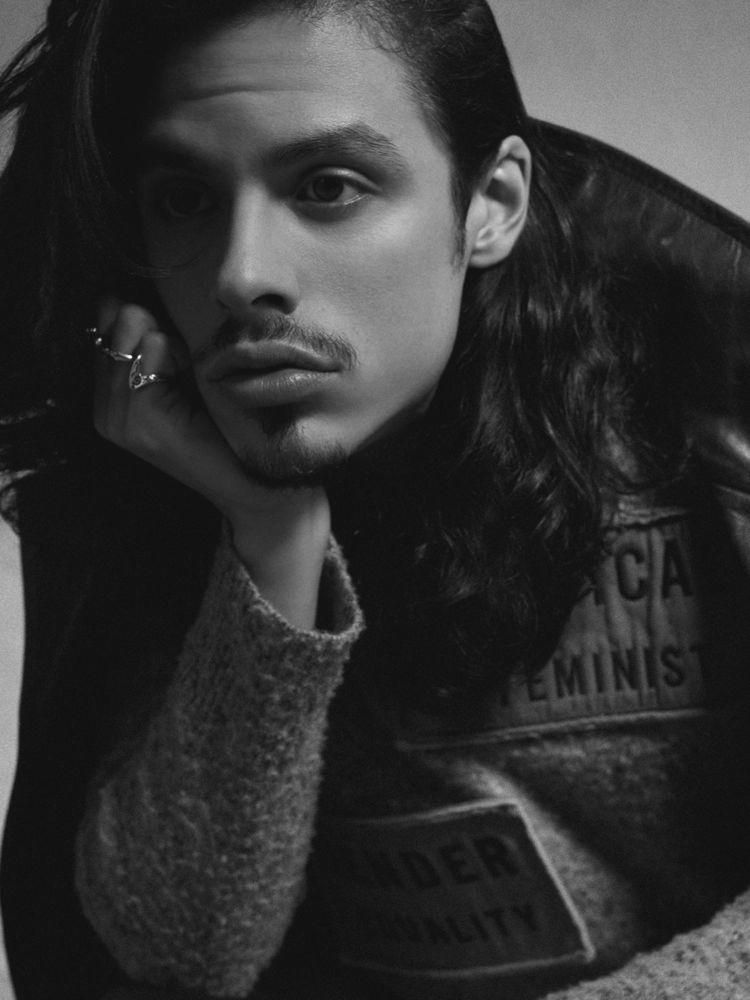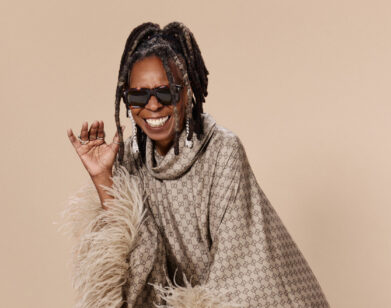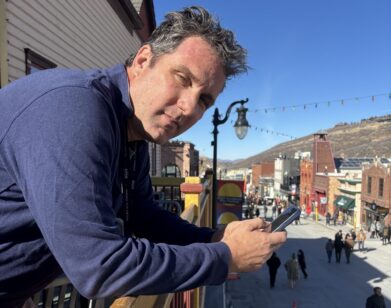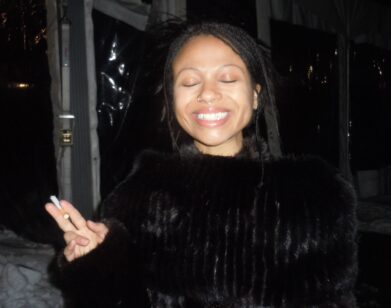Discovery: Jonny Beauchamp
JONNY BEAUCHAMP AT CANDY STUDIO IN MANHATTAN, SEPTEMBER, AUGUST 2015. PHOTOS: HANS NEUMANN. STYLING: GISELLA LEMOS. GROOMING: JESSI BUTTERFIELD FOR EXCLUSIVE ARTISTS MANAGEMENT USING CHANEL COSMETICS AND PHYTO HAIR CARE. STYLING ASSISTANT: ANNESTINE BAE.
There are a few famous names in Stonewall, Roland Emmerich’s entirely un-Roland Emmerich film about the Stonewall Riots: Jeremy Irvine stars as the protagonist, a country boy named Danny who finds himself on Christopher Street; Ron Perlman is Ed Murphy, a real-life pimp-turned-activist; Jonathan Rhys Meyers plays Trevor, a member of the Mattachine Society; Caleb Landry-Jones is “Little Orphan Annie,” one of the street kids inhabiting Christopher Street. The only name you’ll care about upon leaving the film, however, is New York native Jonny Beauchamp.
Stonewall is only Beauchamp’s second film, and his role is a pivotal one. As Ray Castro, a charismatic, homeless youth, Beauchamp is Danny’s guide to city life—the benefits and dangers—and queer identity. Beauchamp based much of his performance on queer activist Sylvia Rivera. “I read it and to me it immediately screamed Sylvia Rivera,” the actor explains. “I’m not playing Sylvia Rivera, I’m playing Ray, but I think there’s a lot of Sylvia in Ray.”
While filming Stonewall, Beauchamp was cast as Angelique, a transgender woman on Showtime’s Penny Dreadful. “I would have never have been considered had I not been in Stonewall,” he says. “I owe everything to Roland Emmerich.” Earlier this month at the Toronto Film Festival, he was named as one of EW’s “Rising Stars” alongside the much more established Brie Larson.
HOMETOWN: New York City. I’m born and raised in New York. I left for about ten years; we moved to Rockland County because we couldn’t afford a good private school and my mom is adamant about education. She’s off the boat from Puerto Rico and put herself through school. She worked a full-time job, took care of me and my grandmother, and then went to night school. She really pressed the importance of education, so we moved to a place where they had a really good public school.
A NEW ENVIRONMENT: We moved next to a national state park. I grew up in ponds and the woods, very much a nature kid, but also really a city kid. I would say it was probably the best thing my mother ever did in terms of helping me with acting because at a young age it really taught me how to navigate different spaces with the way I speak and the way I hold myself, just to make people more comfortable. It’s just a little bit different.
EARLY ROLES: Everyone would always tell my mom, “You should put your kid in commercials. Your kid’s an actor.” She was adamant about that not happening. She wanted me to be a doctor, or something stable. There was a school play in fifth-grade; I think I was 11. They were doing Annie at Viola Elementary School. She said I couldn’t do it. I just signed her signature and I went to the audition anyways. I got Rooster, which was a part I really wanted because he’s bad and gets the good boy song in the show. That’s all I really cared about. The week of the show, they called my mom to ask if she wanted to help out with costumes. She was like, “No, no, you’ve got the wrong house.” And they were like, “Is this Ms. Beauchamp?” “Yeah.” “Well Jonny is the lead in the show next week, are you going to come?” When she found out, I didn’t get in trouble, but she was kind of wary about it. She went and she was like, “Wow, my son is really passionate about this. He did this all by himself.” From then on she allowed me to pursue it. I did all the school plays and theater groups and stuff like that.
EARLY INFLUENCES: I saw that film Fame. It was freshman year of high school. I had been sneaking into New York City on the Greyhound bus for 10 dollars to go see Broadway shows. I had my little piggy bank savings. I would go and get student tickets or the standing room to see shows. I took myself to see Cabaret. I had never seen a play like that in my life. It was a beautiful hybrid of political mixed messages, holding a mirror to the times, and also amazingly entertaining. It was so gritty and crass and very lascivious. I had only seen Beauty and the Beast and Lion King, that was the first time I saw a musical theater piece that said a little something. It struck me. I saw it twice the closing week.
BACK IN NEW YORK CITY: I knew I had to go back to the city, that’s where I belonged. I had friends, but I was a sore thumb; even with 4,000 kids in the school, I stuck out a lot. I had a lot of issues with a lot of the other kids. It wasn’t until I started embracing myself and being myself—I tried to win them over and it never worked out, but when I was just like, “Fuck you,” it didn’t matter. I asked my mother if we could move back. I took myself really seriously and I knew that I needed to be in that world. I needed to get an agent. I knew that this was a job and this was not easy and I didn’t look like everyone else. Mind you, I was just going for theater, I didn’t think I had a chance in the movies. Movies were my dream, but I never thought I had a chance. I thought I would be something in theater and then maybe get to do a movie of the theater piece. So, we sold our entire house, we moved into a tiny studio in Manhattan, just so I could go to school. I went to Professional Performing Arts, which is in Hell’s Kitchen. It was in the heart of the theater district and it was the only school that offered musical theater as a major. All of my close friends, to this day, actually come from PPAS. We’ve all done pretty nicely. Connor Paolo was in my class, he’s always been acting, he’s been or Broadway, television, movies, he’s phenomenal. Paul Iacono, he’s doing a lot; he was on RJ Berger. Kia LaBeija, who’s huge in the art scene right now and in the vogue scene, she’s the house mother of the House of LaBeija. She’s phenomenal. She’s such an inspiration to me.
HOW TO MAKE IT ON HOW TO MAKE IT IN AMERICA: I was in one episode. It my junior year of college and I had just started working with my current manager. I think the reason I got that part was because no one could make sense of the one line: “Ain’t no popo, he’s looking for this real pussy with the cherry on top.” But I had hung out in the Village with the girls. I wasn’t in the ballroom scene, but I was close with Kia and I had a lot of friends in the ballroom scene and I loved Paris is Burning. That was really informative in my teen years. It was the first representations of different lifestyles in the queer world. That’s why I think it was easy for me. I didn’t think I was going to get it, I was just going in to go in for it, and I got it that week. It was my first ever thing on set, I’ll never forget it. It was about eight hours of just waiting around and then I had about 10, 15 minutes to actually get the scene. I had never worked on camera before. I didn’t understand what was going on. I got to say my line to Luis Guzmán, who is an amazing Latin actor, so I was really kind of intimidated. He actually started doing some method stuff with me that I wasn’t privy to at the time. I was like, “Is he really insulting me?” It took me a take to realize, “Oh, no, he’s actually helping me.” Would I say it was really good work? No, I think I sucked. But just the fact that I got that moment with Luis Guzmán; without even introducing himself, without even meeting, he threw me in and was working with me as if we had been working together for years. That was such an honor. Then I didn’t work for a really long time. [laughs]
THE POST COLLEGE SLUMP: I was living in a slum in Washington Heights. It was two years post-college; I was roughing it. I did an indie film, Thirsty, and I’d never done a film before. I realized this was a skill that was different from theater. I figured it out. I was good on film. It’s hard to explain. I was taking a lot of shit at my [day] job at a restaurant. I was working really hard and I couldn’t make ends meet so I said, “Screw this, I’m out. I’m 25 years old. I have a degree in theater and a minor in gender and sexuality studies and I’m not qualified to do anything.” That was a scary day. I thought to myself, “Maybe I need to look into Delta Airlines. I can’t just work in a café forever.” I actually almost applied to Delta Airlines. I was going to be a steward. At least I’d get to travel and meet people. I couldn’t be mundane. Then I thought, “Was I really trying as hard as I could? Was I doing everything I could to pursue this?” And I wasn’t. I wasn’t doing everything I could. So I decided to give myself a year. That meant to me, if you’re an artist, you’ve got to be an artist every day, you can’t just be an artist when it’s convenient. So everyday I would wake up, get a cup of coffee—that’s all I could afford, coffee and cigarettes—and I would either stream a film and dissect, or go to a play, see a friend’s performance, or go to a class. To make money, I was coaching children on their auditions and coaching a few friends. My rent at that point was a lost cause—wasn’t paying it. I had no heat; I was not going to pay. I was fighting with the courts and the landlords. I forced myself to do something everyday.
THE ROAD TO STONEWALL: A really good friend of mine, who is also from PPAS and is also killing it in the game, Alex Flores, he’s in Maze Runner, we’re quite close and he goes, “Man, I just got a script that I could not be more wrong for, and you could not be more right. You need to go out for this.” And I said, “Grand! Amazing.” I went to call my agent and right at that moment my phone was cut off. So I go to email, and my internet was cut off. So I went Monday to the public library to email my flipping manager. I probably should have just called him on someone else’s phone, but I had pride. I didn’t want anyone to know that I didn’t have a phone. I didn’t want my mother to know that I was 10 pounds underweight and hadn’t eaten in three days. She would feel like she has to help me; I’m her baby. I opened my email and I had an audition for Stonewall already and it was the next day. I immediately started watching videos of Sylvia Rivera. I was watching all her speeches. I didn’t sleep. I went down to Christopher Street and started talking to the ladies. I had a couple of friends, I called up some of my girls and I was like, “Listen, we need to have a conversation about how things are going.” They were really helpful. Went in for it. Thought I nailed it. Never heard back. I was like, “There’s no one else for this role, I’m the only one who can play this role! I know I’m the only one who can play this role and I will have to do anything I can to do it.” I just felt so defeated. I was beating myself up over it. Then, some terrible things happened. I lost a dear, dear friend of mine. She passed and it really messed me up. They were having trouble burying her because of finances. My best friend, Glenn Fleary, he came up with the money and made sure that happened. We handled the entire funeral process. Everyone did a piece. The next day, they called me and said, “You’re going to meet with Roland Emmerich.” I was like, “You sure have a funny way of working, world.” I was in absolute shambles. I didn’t sleep, I was with my candle talking to my friend like a lunatic at night, reading the script to my friend. I heard this voice—she was very fabulous—like “Oh, bitch, you got it.” It’s just a stupid thing your mind does to trick you, but just hearing her voice saying, “You got this, you got this.” So I woke up the next day and I stole some shampoo. I had really bad dandruff that day and I couldn’t afford fucking shampoo, so I stole Head and Shoulders shampoo. I didn’t want to look dusty to meet Roland Emmerich. I went in as Ray. I thought that was the best idea. So I was swearing a lot; I was just really tough. We had a good rapport. We talked to each other like people. I didn’t hear back for another three months. Then I finally got the call, “You’re in it, Roland wants you, there’s no one else. You’re doing it. You’re flying out in a week.”
THE FIRST DAY ON SET… I was nervous, really nervous. I was little bit late to my scene because I was really sick in my trailer, I was shaking. They all thought it was really endearing. Roland was really gentle with me, he was like, “How are you doing? You good? Okay, come on let’s do the scene.”
PENNY DREADFUL: During shooting Stonewall, Penny Dreadful came about. My manager was like, “Honey, you’ve got to fly to L.A. because you’re right for this. They don’t know it, but they need you.” I was like, “I’m in the riots right now!” We were doing 18-hour days, there’s no way for me to leave to audition. I read the role and I was like, “No one else could do this either. This is a really difficult role. She’s got to be British, she’s got to be beautiful, she’s got to pass as a woman, she’s got to be petite. She’s got to be immensely sexy. What am I going to do?” We got a 20 minute break, and Jeremy Irvine, who’s fucking amazing, I asked his friend Hannah if she would come into my trailer with me and read a scene. I’m in a seventies outfit, I’m Ray with blood on me, and I just did the audition on my iPhone in 15, 20 minutes and I sent it in. They loved. I wrapped Stonewall on a Saturday, flew to New York on Sunday, went in person on Monday, got a call from John Logan on Wednesday saying that he loved my tape, he gave me notes, and I did the notes. That Sunday, flew into Dublin, got in Monday morning, went straight to the studio, wig, costume fitting, make-up test. Woke up Tuesday, did the screen test for hours, flew back Wednesday, got the role that Friday night. I was actually being evicted from my apartment; the marshal was going to come and throw me out. So I literally packed up all my shit and moved to Dublin for six months.
NEXT UP: I just got a small part in this film called Fog City. It’s kind of a horror, thriller, interesting indie project. We’ve got some pretty good actors in it. Dave Franco is in it. That’s in Cape Cod. [Then] there’s something in the works that’s meant to film in New York City in November, December. I’m not allowed to talk about it yet. I did a little indie film, Black Wake a couple weeks back.
STONEWALL OPENS IN SELECT THEATRES TODAY, SEPTEMBER 25.







